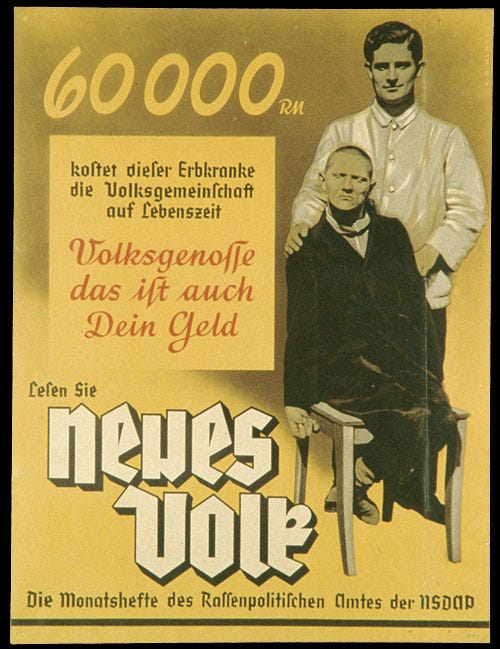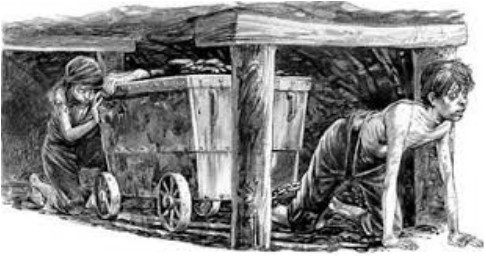Yesterday I started reading Rob Sewell’s book Chartist Revolution. I’ve been looking forward to this one for a while. Chartism was a working class movement in Britain, which in its most acute phase lasted from about 1838 to 1848. That description doesn’t quite do it justice. In fact, Chartism was the first true working class movement anywhere—a revolutionary force that sought to end the suffering endured by countless men, women, and children toiling away in factories across England during the Industrial Revolution. Britain was the world’s first industrialized nation. But its unprecedented wealth and globe-spanning empire were built on unprecedented exploitation, misery, and oppression.
In the first chapter, Sewell outlines the squalor and unsanitary living conditions workers lived in, which bred mass disease and death; horrific working conditions marked by child labour and zero concern for safety, which caused many deaths and injuries; and work days that could last up to 20 hours. He describes the brutal dictatorship of the workplace, in which every aspect of workers’ lives was tightly controlled. So shocked was Friedrich Engels at the inhumanity he witnessed during this period that he felt compelled to write his groundbreaking 1845 study, Conditions of the Working Class in England.
Along with cataloguing the hardships of the workers, Sewell—drawing heavily upon Engels’ work—illuminates the mentality of the British ruling class that forced such suffering on the masses in the name of profit. In order to maximize profits, the capitalists needed to make wages as low as possible while making the work day as long and intense as possible. At this time there were no trade unions in which workers could collectively defend their interests, nor any laws regulating the degree of exploitation. The obscene wealth of a few required the poverty of the many, as has been true for all forms of class society throughout history. As with predecessors such as slave society and feudalism, capitalism required an ideology that would enshrine this hierarchy, inequality, and poverty of the masses as natural and inevitable.
Edmund Burke, known as the founder of modern conservatism, made clear his contempt for the masses, whom he derided as the “swinish multitude”. He opined of the working class: “Patience, labour, sobriety, frugality and religion, should be recommended to them.” In other words, work hard and accept your miserable lot in life. Thomas Malthus held that the reason for widespread hunger and poverty was not an economic system that required the poverty of the masses, but rather overpopulation. His ideas justified the death of the poor from hunger and disease, on the basis that it would reduce the “surplus population”.
“But that was a long time ago!” you may protest. “Things have changed so much since then.” Have they?
Sewell makes a convincing case that no, they have not. In his preface, he notes a Sunday Times report which claimed that at a private event in February 2020 to discuss the COVID-19 pandemic, the U.K. prime minister’s chief advisor Dominic Cummings summarized the government’s strategy as “herd immunity, protect the economy, and if that means some pensioners die, too bad.”
Such gross indifference to human life is in capitalism’s DNA. In a system based on the maximization of private profit, everything else is secondary. Capitalism requires poverty and mass death. We react with horror to Cummings saying the quiet part out loud. But in fact his thinking exemplifies the criminal response of capitalist governments around the world to the pandemic.
The first waves of COVID-19 killed off huge swathes of the elderly and those with underlying medical conditions. Under the logic of capitalism, these groups are seen as expendable. Since retired elderly folks do not produce profits for the capitalists, they are seen as a burden on society. To use Malthus’s term, they are part of the “surplus population”. And if they die—well, as Cummings said with brutal frankness, “too bad.” Doug Ford’s government in Ontario oversaw thousands of deaths in privately owned long-term care homes, where conditions for residents were horrific and workers underpaid and overworked to maximize profits. Conservative leaders in Ontario have close ties to those long-term care facilities that profit off the misery and death of seniors. Yet after overseeing 13,000 deaths in Ontario because of COVID, Ford’s government sailed back into power this week with a second majority government.
For all the horror that bourgeois commentators profess for the Nazis’ eugenics policies—which included sterilization and euthanasia of groups such as the disabled and mentally ill whom the Nazis considered “life unworthy of life”—these policies simply took the brutal Malthusian logic of capitalism to its most extreme conclusion.

Like the elderly, these groups from the perspective of the capitalist are part of the “surplus population”. Any groups that do not generate profits for the capitalists, or who present an obstacle to maximizing profits, are seen as expendable. This is true under any form of capitalism, from fascism to liberalism.
Governments around the world, including provincial governments across Canada, have abandoned all COVID-related public health measures and say we must “learn to live with COVID” (meaning workers and the poor must learn to die with COVID). In doing so, they are doing exactly what the far-right, so-called “Freedom Convoy” demanded. All policies that interfere with the maximization of profit must be discarded, regardless of the cost in public health or human life.
That same mentality pervades every aspect of capitalism today, just as it did in 19th century England. It’s visible at the level of the individual workplace: Jeff Bezos became one of the world’s richest men by extracting as much surplus value as possible from Amazon workers, who are under constant surveillance and regularly have to urinate in bottles because they can’t take bathroom breaks. Companies in China pay slave wages to workers who live in overcrowded dormitories and grow sick from chemical exposure, in conditions very similar to those Engels described in the rapidly industrializing England of his time.
It’s also visible in the actions of the state, from the local to international levels. City governments cut social programs while increasing the budgets of police who will not run into a school while a shooter is actively murdering children, but will pepper-spray and arrest parents who demand that they help. Wealthy imperialist countries deny life-saving vaccines to poorer countries; impose sanctions that deny them food, fuel, and medicine; and slaughter millions of people in wars whose only purpose is to guarantee the profit margins of banks, oil corporations, and weapons manufacturers.
We say socialism is a system built around human need rather than private profit. But I think it goes even deeper than that. Socialism is a worldview that truly values human life not just in words, but in deeds. “The life of a single human being is worth more than all the property of the richest man on earth,” Che Guevara said. At a time when millions of people have died from a preventable pandemic, when tens of billions of dollars in weaponry are being funneled to Ukraine while millions of children go hungry; when the response of governments to growing poverty and an ongoing pandemic is to increase funding to police; and when media celebrate the richest men on earth whose wealth is based on literally working their employees to death, it’s more important than ever to remember that.






And human decency...and empathy...Basically, anything for the greater good in the name of profit.